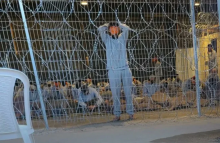
A leaked photograph of the detention facility shows a blindfolded man with his arms above his head. Photo: CNN
Three Israeli whistleblowers who worked at the notorious Sde Teiman prison camp in the Negev desert offered horrifying accounts of the treatment of Palestinians held there, telling CNN that the facility’s doctors have amputated limbs due to handcuffing injuries, allowed detainees’ wounds to rot, and carried out vicious beatings.
A medic who worked at Sde Teiman’s field hospital said that Palestinian detainees there are stripped “of anything that resembles human beings” and that the harassment and torture are done not to “gather intelligence” but “out of revenge” for the October 7 attacks.
Israel has detained thousands of Gaza residents since October, with many of them held under a recently amended law that empowers Israeli authorities to imprison people indefinitely without charge or due process. Human rights organizations have documented Israeli forces’ brutal and degrading treatment of Palestinian detainees, including women and children.
At the field hospital, CNN reported, “wounded detainees are strapped to their beds, wearing diapers and fed through straws.”
A medic who worked at Sde Teiman’s field hospital said that Palestinian detainees there are stripped “of anything that resembles human beings.”
One Israeli whistleblower took a photograph of a room at the facility, which the person said was filled with a “putrid stench” and the sound of “men’s murmurs” as they were “forbidden from speaking to each other.”
“We were told they were not allowed to move,” the whistleblower said. “They should sit upright. They’re not allowed to talk. Not allowed to peek under their blindfold.”
The whistleblower accounts, according to CNN, “paint a picture of a facility where doctors sometimes amputated prisoners’ limbs due to injuries sustained from constant handcuffing; of medical procedures sometimes performed by underqualified medics earning it a reputation for being ‘a paradise for interns’; and where the air is filled with the smell of neglected wounds left to rot.”
The testimony provided to CNN is consistent with details that a doctor at the camp’s field hospital included in a recent letter to top Israeli officials. The doctor described unlawful and inhumane conditions; in a single week, the person said, “two prisoners had their legs amputated due to handcuff injuries, which unfortunately is a routine event.”
A report published last month by Al Mezan, a Palestinian human rights organization, also documented “harrowing accounts of torture and inhumane treatment” of people detained by the Israeli military.
“A 19-year-old detainee told an Al Mezan lawyer that he was tortured from the moment he was arrested,” the group said. “He described how three of his fingernails were removed with pliers during interrogation. He also stated that investigators unleashed a dog on him and subjected him to shabeh—a form of torture which involves detainees being handcuffed and bound in stress positions for long periods—three times over three days of interrogation. He was then placed in a cell for 70 days, where he experienced starvation and extreme fatigue.”
“We were told they were not allowed to move,” the whistleblower said. “They should sit upright. They’re not allowed to talk. Not allowed to peek under their blindfold.”
Mohammed Al-Ran, a Palestinian doctor who was arrested by Israeli forces in December, told CNN that he was “stripped down to his underwear, blindfolded and his wrists tied, then dumped in the back of a truck where… the near-naked detainees were piled on top of one another as they were shuttled to a detention camp in the middle of the desert.”
Al-Ran was held by Israeli forces for 44 days. Just before his release, he told CNN, “a fellow prisoner had called out to him, his voice barely rising above a whisper.”
According to CNN: “He asked the doctor to find his wife and kids in Gaza. ‘He asked me to tell them that it is better for them to be martyrs,’ said al-Ran. ‘It is better for them to die than to be captured and held here.'”
Omar Shakir, Israel and Palestine director of Human Rights Watch, said in response to the new reporting that “what we know about Gaza is only tip of the atrocity iceberg.”
